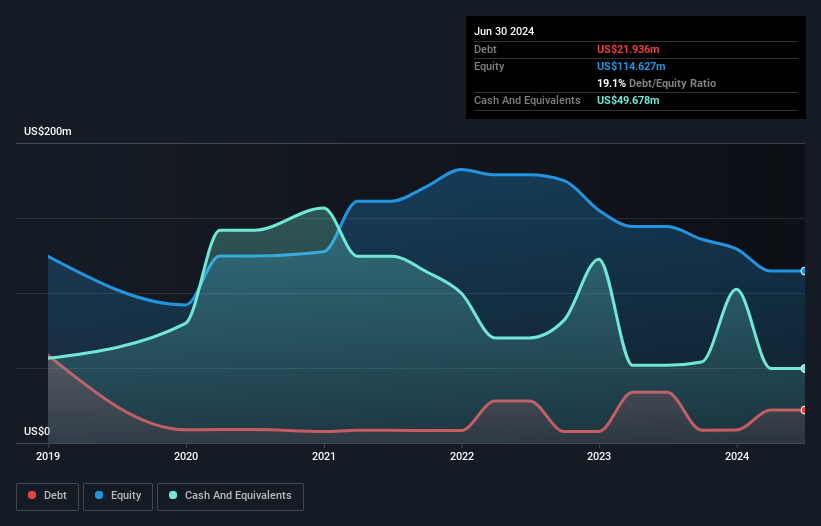- United States
- /
- Specialty Stores
- /
- NasdaqCM:NEGG
Is Newegg Commerce (NASDAQ:NEGG) Weighed On By Its Debt Load?
Howard Marks put it nicely when he said that, rather than worrying about share price volatility, 'The possibility of permanent loss is the risk I worry about... and every practical investor I know worries about.' When we think about how risky a company is, we always like to look at its use of debt, since debt overload can lead to ruin. As with many other companies Newegg Commerce, Inc. (NASDAQ:NEGG) makes use of debt. But the more important question is: how much risk is that debt creating?
When Is Debt Dangerous?
Debt assists a business until the business has trouble paying it off, either with new capital or with free cash flow. In the worst case scenario, a company can go bankrupt if it cannot pay its creditors. However, a more usual (but still expensive) situation is where a company must dilute shareholders at a cheap share price simply to get debt under control. Of course, plenty of companies use debt to fund growth, without any negative consequences. When we think about a company's use of debt, we first look at cash and debt together.
View our latest analysis for Newegg Commerce
What Is Newegg Commerce's Debt?
The image below, which you can click on for greater detail, shows that Newegg Commerce had debt of US$21.9m at the end of June 2024, a reduction from US$33.9m over a year. However, its balance sheet shows it holds US$49.7m in cash, so it actually has US$27.7m net cash.

How Strong Is Newegg Commerce's Balance Sheet?
We can see from the most recent balance sheet that Newegg Commerce had liabilities of US$198.2m falling due within a year, and liabilities of US$65.6m due beyond that. Offsetting these obligations, it had cash of US$49.7m as well as receivables valued at US$39.3m due within 12 months. So its liabilities total US$174.8m more than the combination of its cash and short-term receivables.
This deficit is considerable relative to its market capitalization of US$240.7m, so it does suggest shareholders should keep an eye on Newegg Commerce's use of debt. This suggests shareholders would be heavily diluted if the company needed to shore up its balance sheet in a hurry. While it does have liabilities worth noting, Newegg Commerce also has more cash than debt, so we're pretty confident it can manage its debt safely. The balance sheet is clearly the area to focus on when you are analysing debt. But it is Newegg Commerce's earnings that will influence how the balance sheet holds up in the future. So if you're keen to discover more about its earnings, it might be worth checking out this graph of its long term earnings trend.
In the last year Newegg Commerce had a loss before interest and tax, and actually shrunk its revenue by 10%, to US$1.4b. We would much prefer see growth.
So How Risky Is Newegg Commerce?
While Newegg Commerce lost money on an earnings before interest and tax (EBIT) level, it actually generated positive free cash flow US$3.2m. So taking that on face value, and considering the net cash situation, we don't think that the stock is too risky in the near term. Until we see some positive EBIT, we're a bit cautious of the stock, not least because of the rather modest revenue growth. When analysing debt levels, the balance sheet is the obvious place to start. However, not all investment risk resides within the balance sheet - far from it. We've identified 2 warning signs with Newegg Commerce (at least 1 which is potentially serious) , and understanding them should be part of your investment process.
If you're interested in investing in businesses that can grow profits without the burden of debt, then check out this free list of growing businesses that have net cash on the balance sheet.
The New Payments ETF Is Live on NASDAQ:
Money is moving to real-time rails, and a newly listed ETF now gives investors direct exposure. Fast settlement. Institutional custody. Simple access.
Explore how this launch could reshape portfolios
Sponsored ContentValuation is complex, but we're here to simplify it.
Discover if Newegg Commerce might be undervalued or overvalued with our detailed analysis, featuring fair value estimates, potential risks, dividends, insider trades, and its financial condition.
Access Free AnalysisHave feedback on this article? Concerned about the content? Get in touch with us directly. Alternatively, email editorial-team (at) simplywallst.com.
This article by Simply Wall St is general in nature. We provide commentary based on historical data and analyst forecasts only using an unbiased methodology and our articles are not intended to be financial advice. It does not constitute a recommendation to buy or sell any stock, and does not take account of your objectives, or your financial situation. We aim to bring you long-term focused analysis driven by fundamental data. Note that our analysis may not factor in the latest price-sensitive company announcements or qualitative material. Simply Wall St has no position in any stocks mentioned.
About NasdaqCM:NEGG
Newegg Commerce
Operates as an electronics-focused e-retailer in the United States, Canada, and internationally.
Excellent balance sheet with very low risk.
Similar Companies
Market Insights
Weekly Picks

Early mover in a fast growing industry. Likely to experience share price volatility as they scale


A case for CA$31.80 (undiluted), aka 8,616% upside from CA$0.37 (an 86 bagger!).


Moderation and Stabilisation: HOLD: Fair Price based on a 4-year Cycle is $12.08
Recently Updated Narratives


An amazing opportunity to potentially get a 100 bagger

Amazon: Why the World’s Biggest Platform Still Runs on Invisible Economics

Sunrun Stock: When the Energy Transition Collides With the Cost of Capital
Popular Narratives


MicroVision will explode future revenue by 380.37% with a vision towards success


Crazy Undervalued 42 Baggers Silver Play (Active & Running Mine)


NVDA: Expanding AI Demand Will Drive Major Data Center Investments Through 2026
Trending Discussion


